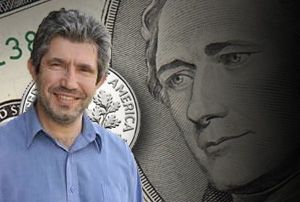Building the wage case
Research news
Deakin research could help to raise 900,000 Americans out of poverty.
Research by Professor Chris Doucouliagos, Chair in Economics within the School of Accounting, Economics and Finance, Faculty of Business and Law, and with the Alfred Deakin Research Institute, has been used in a US Congressional Budget report as part of the White House push to raise the US minimum wage from $7.25 to $10.10.
As reported in “The New York Times” on February 18, the Congressional report, “The Effects of a Minimum-Wage Increase on Employment and Family Income,” quoted a number of studies that found raising the minimum wage has a negligible effect on employment. The Congress report does not use any original research but draws on various studies on the impact of past minimum wage increases, to achieve a meta-analysis.
Professor Doucouliagos conducted his research in conjunction with Tom Stanley, Professor of Economics at Hendrix College (US). The two researchers applied newly-developed meta-analysis methods to 64 US minimum wage studies and found little or no evidence of a negative association between minimum wages and employment.
Deakin’s Vice-Chancellor Professor Jane den Hollander said that Professor Doucouliagos’ work “aligns with who Deakin is and what we stand for - inclusion, fairness and enabling participation.”
The Congressional report found that raising the minimum wage to $10.10 would help to reduce poverty and inequality, and benefit 16.5 million low wage workers by the second half of 2016. It also found that, as a result of spillover effects, where employers tend to increase wages slightly above the new minimum (which could bring the minimum up to $11.50), an additional eight million low wage workers would be expected to benefit from the change.
Entitled “Publication Selection Bias in Minimum‐Wage Research? A Meta-Regression Analysis,” Professor Doucouliagos’ research was originally published in the British Journal of Industrial Relations.
For the project, Professional Doucouliagos applied statistical techniques to detect publication bias in the existing research.
“When there is a bias it leaves a gap - or a statistical trail - and we were able to uncover that and make a more accurate finding,” he said.
“We found there was bias in the minimum wage literature because people expected to find negative effects, so they thought they were wrong when they didn’t find them. The traditional minimum wage has been very low in the US, so when it has been raised it has never had much bite. In places like Georgia, it is still only $5 an hour.”
As to the final outcome, we should know if the Bill passes through Congress by the end of March.
- Details about the Congressional Report can be found in the “New York Times”.
Share this story
 Professor Chris Doucouliagos
Professor Chris Doucouliagos
